Is January Cash 23 CashApp Survey a SCAM?
January Cash 23 CashApp Reward Survey is a survey scam that uses social engineering methods to trick unsuspecting victims into providing sensitive personal information. Survey scam is yet another form of phishing. Such scams take many forms such as a website, call, email, text, social media post or an online ad. In this technique, scammers invite users to participate in a survey and win a prize. The survey is just an excuse to phish for valuable personal and financial information.
In this particular case, the scam invites users to participate in a survey and win $750 from CashApp. The scammers’ goal is to get users to click on a phishing link offering “free $750” as bait. The scam uses phishing sites disguised as legitimate CashApp pages. It must be emphasized that CashApp has nothing to do with these sites. These sites should be avoided!
Scammers use different ways to promote Survey scams, usually WhatsApp, Facebook, YouTube, Twitter, and other social networks. In addition, January Cash 23 CashApp Reward Survey can be promoted through deceptive ads, as well as Adware and potentially unwanted applications (PUAs).
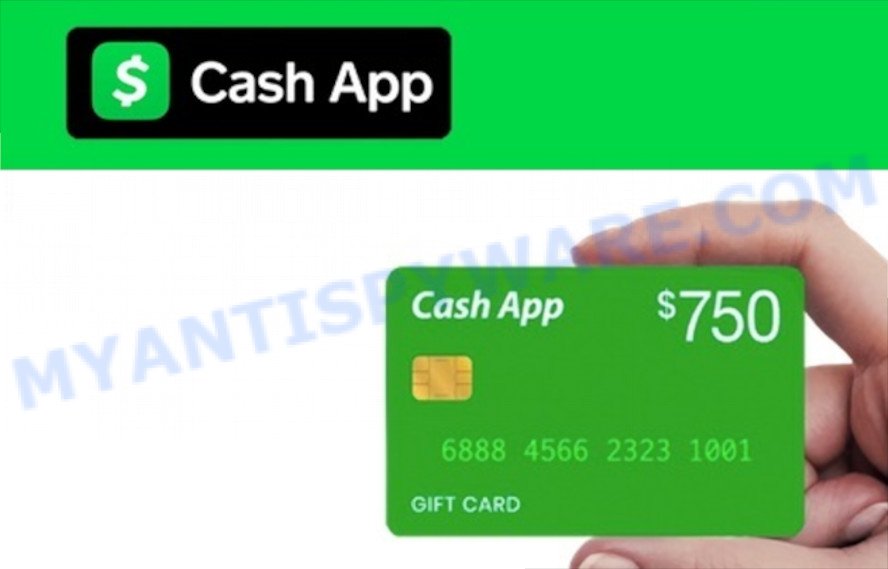
QUICK LINKS
- Is the January Cash 23 CashApp Survey a SCAM?
- How to identify CashApp Reward Survey Scams?
- How to protect against CashApp Reward Survey Scams
- Removal
- Report a Scam
January Cash 23 CashApp Reward Survey Scam in detail
January Cash 23 CashApp Reward Survey says that you have a chance to win $750 by taking part in a survey. Unfortunately, anyone who follows the instructions detailed on the site will fall victim to the scam.
After answering the questions, you will be redirected to another page containing a form that you must fill out with your personal data (email address, etc). As mentioned above, the goal of scammers is to obtain your personal details, as well as your credit card information. Scammers can use your email and personal information to run phishing scams, steal identities for personal and financial gain. Moreover, the criminals can use stolen email addresses and phone numbers to send spam and malspam (spam emails containing malware or links to malware).
This scam is used primarily to harvest victim details that can be used in identity theft and fraud. Sometimes this scam can be used to trick you into signing up for a “free trial” offer that’s actually an expensive subscription to products that you did not agree to buy.
To summarize, January Cash CashApp Reward Survey is a SCAM. It can lead to malware infection, loss of data, financial losses, theft of personal information and other serious problems.
How to identify CashApp Reward Survey Scams
Common CashApp Reward Scams often have similar red flags, such as a sense of urgency or a request for money. Here’s how to identify a CashApp Reward Survey scam before it happens.
- If you receive a text message that invites you to take part a CashApp Reward Survey, don’t respond or click on any links. Stop and think. An unexpected text message is often the first sign of a scam. Scammers use this tactic to harvest your personal information.
- The most obvious way how to spot a fake CashApp Reward Survey is finding inconsistencies in domain names, phone numbers and email addresses. If the text claims to be from the CashApp, but the message is being sent from a random phone number or email address, it’s probably a scam.
- Copy the “CashApp Reward Survey” link from the message, use a free URL Checker (https://www.virustotal.com/gui/home/url) to check suspicious links. It allows checking the safety of a link without clicking on it.
- If you have the slightest suspicion a CashApp Reward Survey may be a scam, do not click on the links you see.
- The text message creates a sense of urgency. Creating a false sense of urgency is a common trick of phishing scams. Be suspicious of texts that claim you must call or click a link immediately.
Threat Summary
| Name | January Cash 23 CashApp Reward Survey Scam |
| Type | survey scam, social engineering, phishing, fraud |
| Distribution method | spam email campaigns, social networks, deceptive ads, adware and potentially unwanted applications |
| Symptoms | unwanted ads, fake security warnings, fake system messages, pop-up errors, spam notifications |
| Damage | loss of personal data, disclosure of confidential information, financial losses, malware infection |
| Removal | January Cash 23 CashApp Reward Survey removal guide |
Examples of such scams
The “January Cash 23 CashApp Reward Survey” scam is not the only scam on the Internet that aims to deceive users into providing financial and/or personal information or to send money directly to the attacker. We have already reported other similar scams such as Chrome search contest 2022, Mr Beast Giveaway SCAM, T-Mobile Customer Reward Program, Win SAMSUNG GALAXY S22.
- Decocash.com Coca-Cola Customer Satisfaction Survey SCAM
- Smrturl.co redirects Primark Gift Card Scam
- Mr Beast Giveaway Scam cashbeast.co
- Puchophosurvey.space Online Test Scam
- Elon Musk SpaceX Crypto Giveaway is a SCAM
In fact, there are many more, the Internet is full of fraudulent websites, ads, social media pages, and apps promoting different “giveaway”, “online survey”, and other “get rich quick” schemes. So be careful!
Where did “January Cash 23 CashApp Reward Survey” pop-ups come from
As mentioned above, the January Cash 23 CashApp Reward Survey pop-ups are caused by Adware, malvertising (malicious advertisements), push notifications, followed by software downloads and redirects. Browser (push) notifications are originally developed to alert the user of recently published news. Cyber criminals abuse ‘push notifications’ by displaying unwanted ads. These ads are displayed in the lower right corner of the screen urges users to play online games, visit scam pages, install malicious browser add-ons & so on.
Adware is a term that originates from ‘ad software’. In many cases, ‘adware’ is considered by many to be synonymous with ‘malware’. Its purpose is to generate profit for its developer by serving unwanted advertisements to a user while the user is browsing the Internet.
Typically, adware ends up on personal computers bundled with freeware, malicious downloads, fake updates, shared files, and other unsafe software downloaded by users from the Internet. To avoid installing any adware: choose only the option of manual, custom or advanced installation and disable any third-party applications that you are not sure about.
How to protect against CashApp Reward Survey Scams
To avoid becoming a victim of scammers, it is important to always keep in mind:
- NO ONE EVER WINS MONEY OR PRIZES IN THESE SCAMS!
- NEVER share your personal information.
- Legitimate surveys do not require the disclosure of confidential, personal or financial information.
- Use the official website of the company sponsoring the survey to verify that the survey is legitimate.
- Close the “January Cash 23 CashApp Reward Survey” pop-up as soon as it appears on your computer screen. Scammers can prevent you from closing it in various ways. In such cases, close your browser using Task Manager or restart your computer. If the next time you launch the browser, it prompts you to restore the previous session, abandon it, otherwise this scam will reopen on your screen.
- Use an ad blocker when browsing the internet. It can block known scam sites and protect you from scammers.
How to get rid of “January Cash 23 CashApp Reward Survey” pop-ups (Adware removal guide)
If you suspect that your computer is infected with malware, you accidentally clicked on a link/button in the scam, or just want to scan your computer, then use one of the best free malware removal tools. MalwareBytes is an antivirus that can be used to perform a virus scan, detect and remove almost all the forms of malicious programs including ransomware, trojans, worms, adware, browser hijackers, potentially unwanted software and spyware. MalwareBytes has real-time protection that can defeat most malicious software and ransomware. Despite so many features, it does not reduce the performance of your computer. You can use MalwareBytes with any other antivirus without any conflicts.
First, please go to the link below, then click the ‘Download’ button in order to download the latest version of MalwareBytes.
327268 downloads
Author: Malwarebytes
Category: Security tools
Update: April 15, 2020
When the downloading process is done, close all windows on your computer. Further, launch the file named MBSetup. If the “User Account Control” dialog box pops up like below, click the “Yes” button.
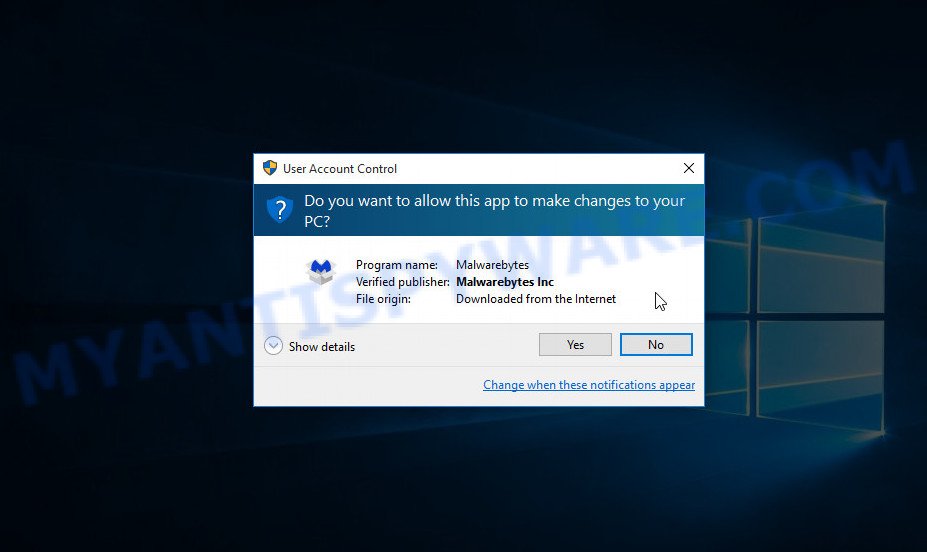
It will show the Setup wizard which will assist you install MalwareBytes on the computer. Follow the prompts and do not make any changes to default settings.
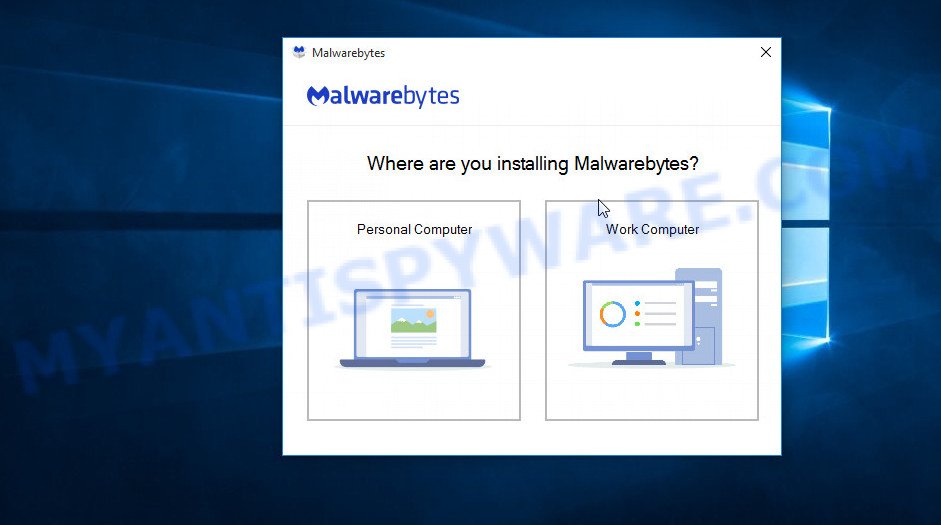
After the setup is complete successfully, press “Get Started” button. Then MalwareBytes AntiMalware will automatically run and you can see its main window such as the one below.
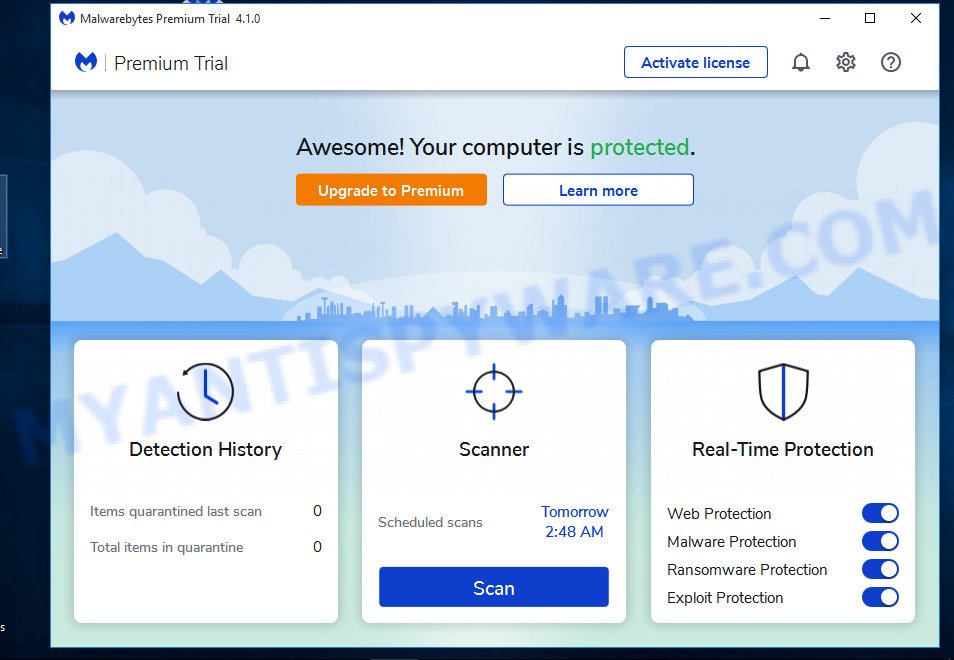
Next, click the “Scan” button for scanning your computer for malicious software and other security threats. A system scan can take anywhere from 5 to 30 minutes, depending on your computer. While MalwareBytes is scanning, you can see how many objects it has identified as threat.
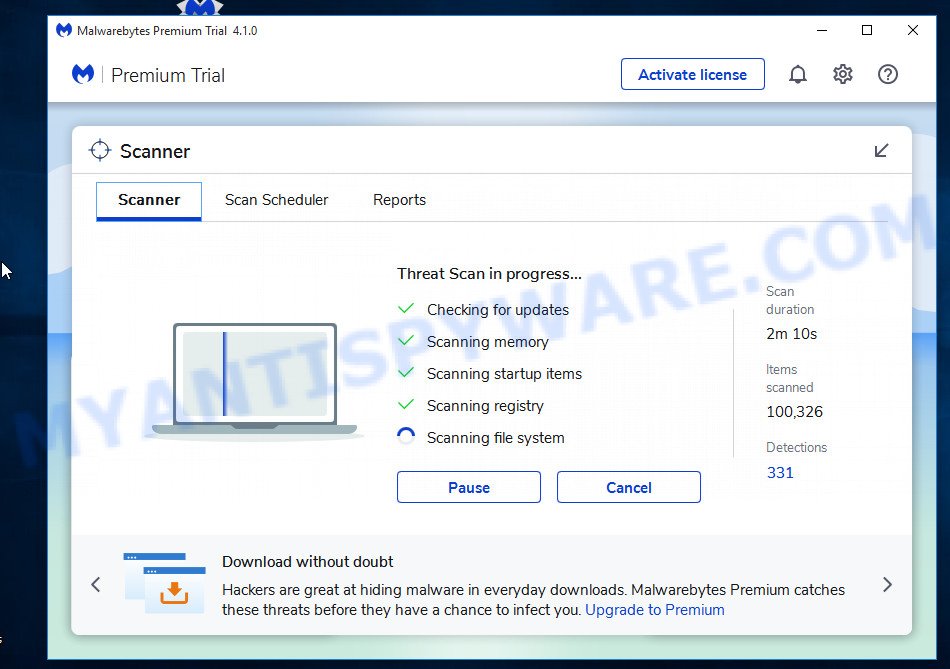
When the scanning is done, the results are displayed in the scan report. In order to remove all threats, simply press “Quarantine” button.
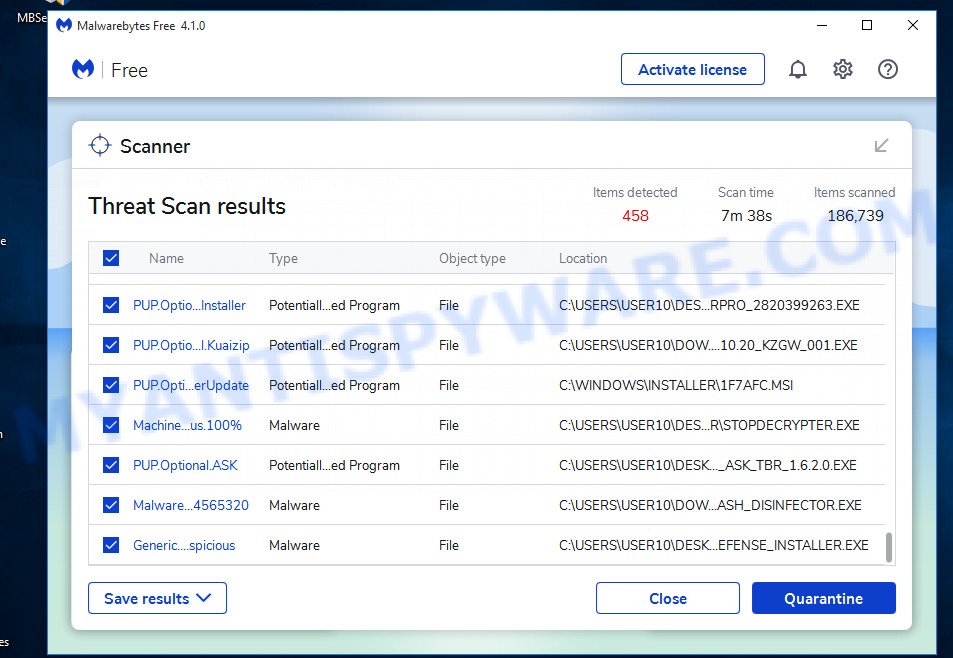
We suggest you look at the following video, which completely explains the process of using MalwareBytes to remove malicious software.
If you are having issues with malware removal, then check out Kaspersky virus removal tool. It can easily remove trojans, spyware, browser hijackers, adware, worms and ransomware with all their components such as files, folders and registry entries. Visit the page linked below to download the latest version of Kaspersky virus removal tool for Windows.
129295 downloads
Author: Kaspersky® lab
Category: Security tools
Update: March 5, 2018
How to protect yourself from phishing, malicious and misleading websites
If you want to protect yourself from phishing sites, install an ad blocking program like AdGuard. It can block malicious and misleading websites, stop unwanted ads and pop-ups while using Internet Explorer, Google Chrome, Firefox and Edge. So, if you like to surf the Internet and want to protect your computer from phishing scams, then AdGuard is your best choice.
Visit the following page to download AdGuard. Save it on your Windows desktop.
26901 downloads
Version: 6.4
Author: © Adguard
Category: Security tools
Update: November 15, 2018
After downloading it, double-click the downloaded file to launch it. The “Setup Wizard” window will show up on the computer screen as displayed on the image below.
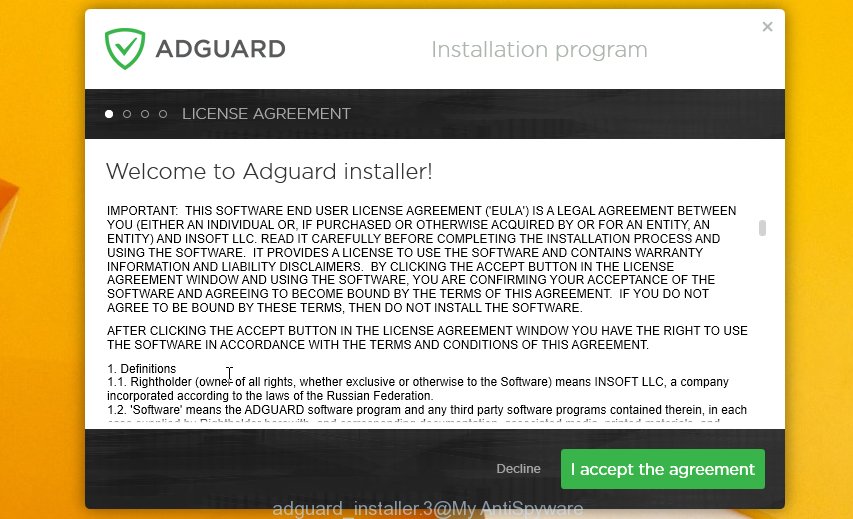
Follow the prompts. AdGuard will then be installed and an icon will be placed on your desktop. A window will show up asking you to confirm that you want to see a quick tutorial as shown in the figure below.

Press “Skip” button to close the window and use the default settings, or click “Get Started” to see an quick guidance which will allow you get to know AdGuard better.
Each time, when you start your computer, AdGuard will start automatically and stop unwanted advertisements, block the “January Cash 23 CashApp Reward Survey” scam, as well as other malicious or phishing sites. For an overview of all the features of the program, or to change its settings you can simply double-click on the AdGuard icon, that is located on your desktop.
Report a Scam
If you encounter the CashApp Reward Survey Scam on a website or social media platform, report it as comment on this article. This helps us to warn users about current scams, monitor trends and disrupt scams where possible.
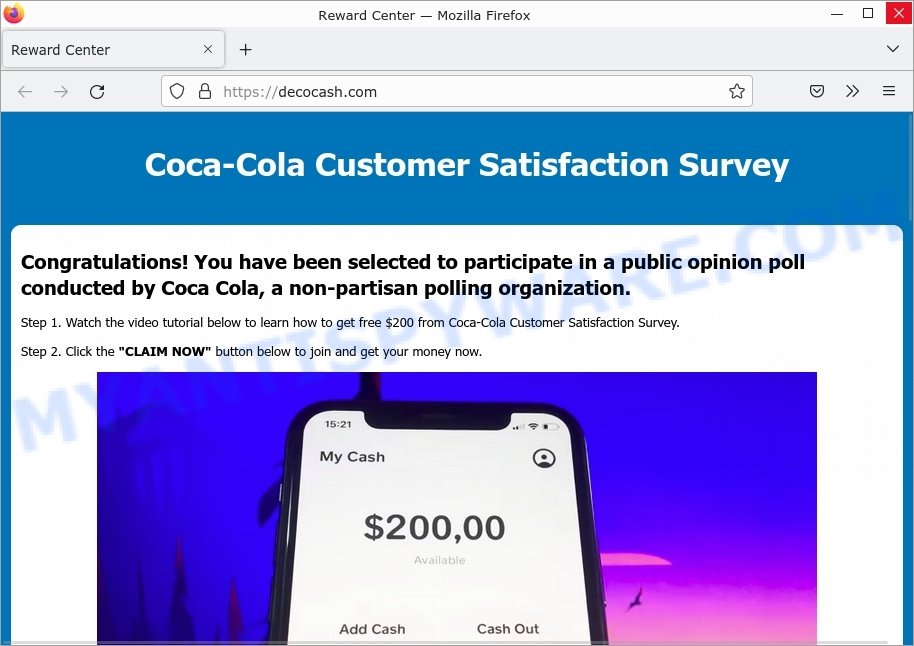
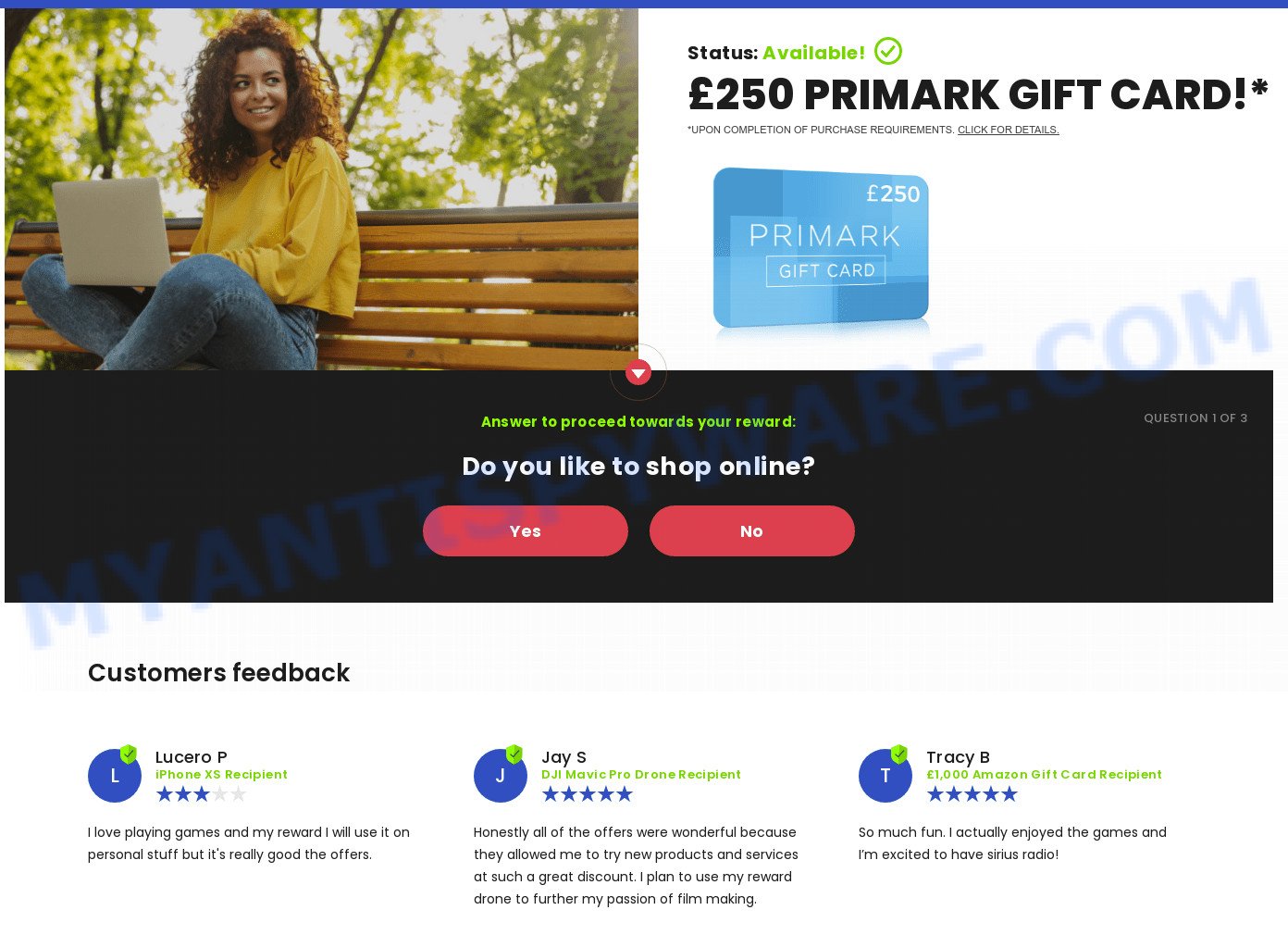

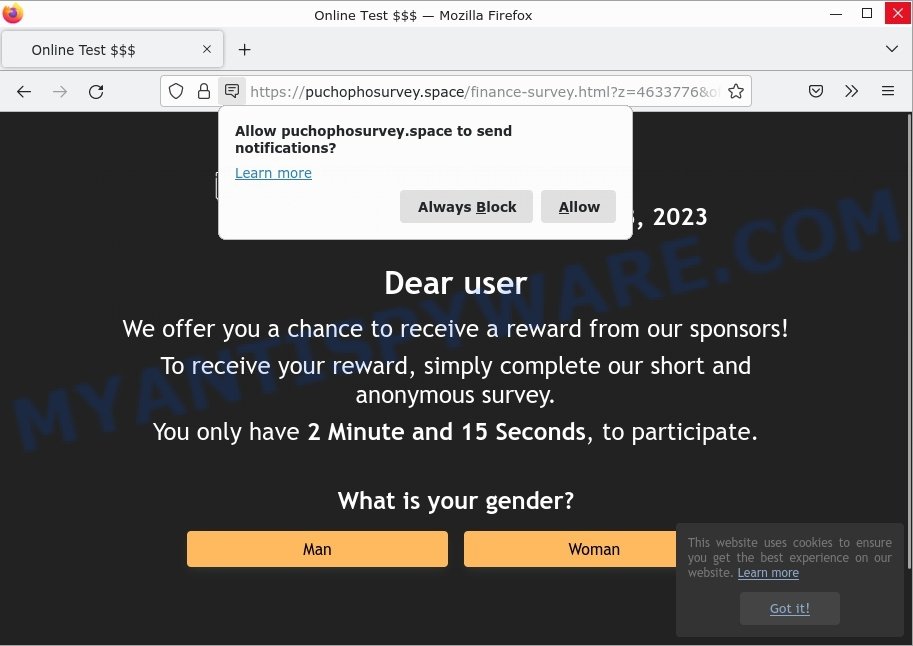

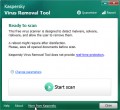



















Beware! I almost fell victim to this scam. Thanks for exposing it. I will make sure to spread the word and warn others not to fall for this fake survey.